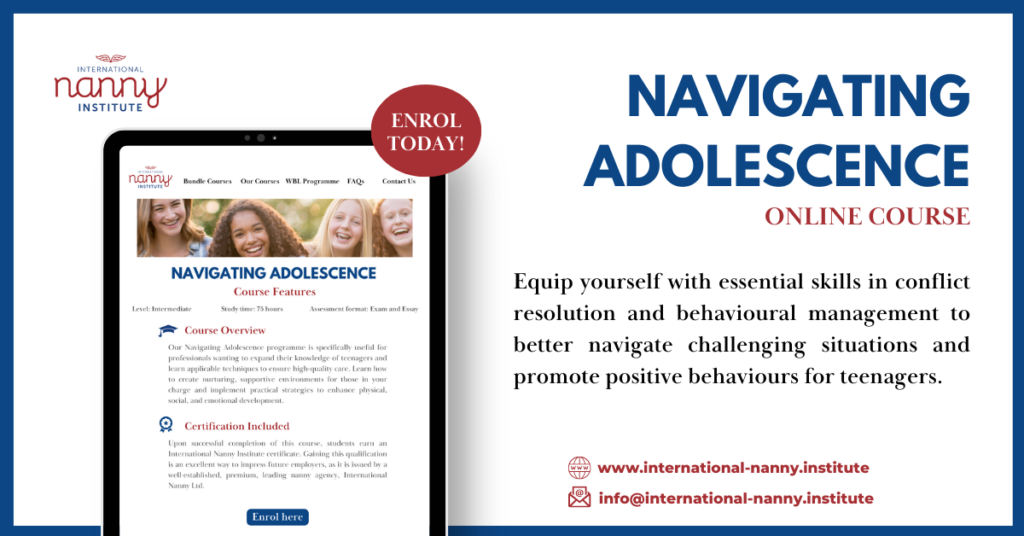Professional nannies have the unique privilege of walking alongside adolescents during one of the most pivotal phases of their lives – the transition from high school to adulthood. This period is filled with both excitement and trepidation as teens prepare to spread their wings and embark on the next chapter.

The challenges of this liminal stage are manifold. Teens must navigate the academic and social pressures of high school, make crucial decisions about their future, and develop the independence and life skills needed to thrive. Additionally, there’s the daunting prospect of leaving the comfort and security of home to face the realities of college, careers, and independent living.
During this complex and formative time, nannies can play a vital role in guiding and supporting adolescents. Drawing on our close relationships and deep understanding of their needs, we are uniquely positioned to help teens navigate this transition with confidence and resilience.
How, exactly, can nannies make a difference? Here are some of the key ways we can prepare teens for adulthood:
Cultivating Life Skills
Many of the day-to-day tasks and responsibilities of adulthood – from budgeting and meal planning to time management and self-care – are skills that teens often lack. As nannies, we can incrementally transfer these practical abilities to the adolescents in our care, ensuring they are equipped to handle the demands of independent living. This might involve teaching them how to do laundry, grocery shop, manage a calendar, or take care of their health and well-being.
Fostering Emotional Intelligence
The emotional upheaval of adolescence can make it challenging for teens to regulate their feelings, manage stress, and engage in healthy relationships. We can help them develop crucial emotional intelligence by modelling healthy coping strategies, validating their experiences, and guiding them through conflict resolution. This could include teaching mindfulness techniques, exploring healthy outlets for their emotions, and role-playing effective communication skills.

Supporting Academic and Career Exploration
High school, or secondary school, is a critical time for teens to start envisioning their future paths. Nannies can support this process by helping them research academic programs, connect with mentors, explore extracurricular activities, and clarify their interests and aspirations. We might assist with college applications, facilitate informational interviews, or brainstorm ways they can gain relevant experience and skills.
Nurturing Independence and Resilience
As we gradually transfer more responsibilities and decision-making to the teens we work with, we empower them to become self-reliant problem-solvers. This fosters the independence, self-advocacy, and resilience they’ll need to navigate adulthood’s challenges. Nannies can provide scaffolding and guidance, gradually releasing control and allowing teens to make mistakes and learn from them in a safe environment.
Providing Consistent Encouragement
The teen years are fraught with self-doubt, insecurity, and the pressure to perform. Nannies can be a steady, affirming presence – celebrating their accomplishments, validating their feelings, and instilling the confidence they’ll need to take risks and pursue their dreams. Simple acts of recognition, like acknowledging their progress or pointing out their strengths, can have a profound impact.

Bridging the Gap to Adulthood
Nannies often maintain close relationships with families even as teens leave home for college or careers. This unique vantage point allows us to help bridge the gap, offering a familiar source of guidance, wisdom, and emotional support during major life transitions. We can provide a sounding board for decisions, offer a listening ear during difficult times, and connect them with resources to ease their way into the next chapter.
Preparing teens for adulthood is a collaborative endeavour, requiring a partnership between nannies, families, and the adolescents themselves. Through care, counsel, and unwavering support, professional caregivers can profoundly shape their journey – equipping them with the skills, confidence, and emotional intelligence to navigate the challenges of adulthood and thrive. It’s a responsibility that should be taken seriously, knowing that the investment made today will blossom into lifelong benefits for the young people in our care.

By working in tandem with parents, nannies can empower the next generation to embrace this pivotal phase of life with resilience, self-assurance, and a clear vision for the future. The International Nanny Institute’s “Navigating Adolescence” course can help you better understand this delicate balance and is an invaluable investment in your professional development. Gain the advanced training to support adolescents through the complexities of social media, identity formation, and the transition to adulthood. Not only will this knowledge equip you to better serve your teen charges, but it will also set you apart as an exceptional, in-demand nanny. Elevate your career, increase your earning potential, and become a transformative guide for the next generation.






















